Truman Capote's "Miriam" is usually described as a horror tale. It was published in 1945, more than twenty years before In Cold Blood would truly make him famous.
The main character is Mrs. H. T. Miller (Miriam) who lives a nondescript life on money from her husband's insurance policy. She stays in an apartment near the East River, is 61, and tends a canary.
One day, she meets a small girl, also named Miriam. We never find out if Miriam is real or a figment of the main character's imagination. If little Miriam exists only in Mrs. H. T. Miller's imagination, we don't know if this overactive imagination has something to do with loneliness or dementia or something else.
What cannot be disputed is that once the little girl attaches herself to Mrs. H. T. Miller, she refuses to go away.
After I reread this story a few days back, I thought about it over night. I'm wondering if perhaps Miriam the 61 year old woman and Miriam the little girl the same person. That is, the older Miriam is being somehow visited by a younger version of herself. The description of the young Miriam is intriguing. She has strange hair--"absolutely silver-white, like an albino's."
We know that Truman Capote also had white hair as a child--the hair is described by Scout in To Kill a Mockingbird, and most people acknowledge that Harper Lee's white-haired boy, the strange boy in her novel, is based on Truman Capote. Lee and Capote were childhood friends.
We also know that Truman Capote felt abandoned by his mother and his father. Little Miriam also seems to be abandoned by anyone who once loved her.
If "Miriam" had come later in Capote's career, I would be tempted to say that he wrote the story as a way to accuse himself of abandoning what was true about his life. In the story, for example, little Miriam derides the older Miriam for a "paper rose" in a vase. "Imitation," the little girl says, "How sad. Aren't imitations sad?"
The little girl also complains about many other aspects of Mrs. H. T. Miller's life, disturbs the old woman's sleeping canary, steels a brooch, and demands to be fed.
Because the story was one of Capote's first, I wonder if perhaps Capote somehow understood, even from a young age, that the big battle in his life would have something to do with authenticity.
Showing posts with label Capote. Show all posts
Showing posts with label Capote. Show all posts
Tuesday, May 13, 2008
Saturday, May 10, 2008
Provincetown / 9
Today has been busy. Allen and I have been making preparations for Provincetown. The biggest part of the weight falls on Allen, who worked all day making a truck cap to keep things dry and safe. I've spent the day gathering the books I want to take. There are so many. I think of Annie Dillard who spent a year in a cabin and later wrote Pilgrim at Tinker Creek. She checked dozens of books out of the library, checking facts, making connections. It's that way for me. There are so many aspects of life that I want to bring into my next novel.
As I was gathering, I suddenly remembered that I have to take every book I have on James Wright, since our boat stop in Martins Ferry was important. I also must take every book I have on biology, Ohio, rivers, mysticism, and fairy tales. And more. That is going to be a load of books.
Last night I reread Capote's "Miriam." I was stunned anew at what a great story it is. Interpretations abound. I thought and thought about the story's meaning last night. I will write about it soon.
As I was gathering, I suddenly remembered that I have to take every book I have on James Wright, since our boat stop in Martins Ferry was important. I also must take every book I have on biology, Ohio, rivers, mysticism, and fairy tales. And more. That is going to be a load of books.
Last night I reread Capote's "Miriam." I was stunned anew at what a great story it is. Interpretations abound. I thought and thought about the story's meaning last night. I will write about it soon.
Labels:
Annie Dillard,
books,
Capote,
Pilgrim at Tinker Creek,
Provincetown,
Writing
Wednesday, April 12, 2006
To Feel Alive

Artist: William Blake.
Capote, to his editor, Robert Linscott, in 1947:
"I am working on the book and it is really my love and today I wrote two pages and oh Bob I do want it to be a beautiful book because it seems important to me that people try to write beautifully, now more than ever because the world is so crazy and only art is sane and it has been proven time after time that after the ruins of a civilization are cleared away all that remains are the poems, the paintings, the sculpture, the books."
Why is it that I so rarely show this kind of enthusiasm in my blog about writing? Why do I so often over-organize my thoughts and over-analyze the writing process?
I think I'm afraid people will think I'm a "flake" if I show too much enthusiasm.
Yet I don't think Capote is a flake when he writes, "...and oh, ... I do want it to be a beautiful book ... only art is sane." Nor was Dickey a flake when he described being so overtaken by the beauty of the writing process that he fell down to his knees in the middle of the street, felled by the power of that feeling.
I watched a documentary on PBS tonight, on Independent Lens. It was about John Trudell, a Native American activist, poet, and songwriter, whose wife and children died when their house was burned as a result of political unrest on the reservation, violence instigated by the US Government. You may know him from the movies. Trudell was in Thunderheart, and other films.
But, for Trudell, it isn't about being a "star." At the end of the documentary, he says something to the effect that he feels the purpose of his life is share his poems and his stories. He knows he is only one man and he isn't singlehandedly going to change the system.
He just wants to be a part of the exchange of information, of thought. He does this through writing because writing gives him a sense of of what it is to be alive. I think this was so for William Blake. He was animated through his art.
That is what I want, too, to feel alive by creating.
Sunday, April 09, 2006
Capote

Photo: Truman Capote, 1924-1984.
I finally got to see Capote. Allen and I rented it and watched it on Saturday, along with Good Night and Good Luck and Broken Flowers.
After the movies, I did a bit of Internet research on the films and ran across Capote's burial site. This is a great site where you can find the graves of many of your favorite authors. I enjoy this site, although my family finds it morbid.
All night, after I'd gone to bed, the three movies swirled in my dreams, mixing with personal experiences. I can't say they were bad dreams, but very strange. I think the three movies together touched on many anxieties I have, both public and private.
Broken Flowers makes me think about how I have always feared coming to the end of my life and thinking that my life has had no meaning.
Good Night and Good Luck makes me think about inhumanity in the world, how politics and inhumanity become synonymous.
Capote certainly brings to the fore many thoughts about writing, why we do it, what the consequences of writing are. I believe so far in my blogs, I've only addressed the positive consequences of writing. Capote suggests there are places our writing can take us that are dangerous to our inner well-being. I have always thought there is a boundary in us, that, once crossed, destines us to be wanderers in our own lives, lost. Perhaps Truman Capote crossed that line.
Subscribe to:
Posts (Atom)
Pages
Dreaming
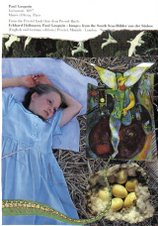
About Me

- Theresa Williams
- Northwest Ohio, United States
- "I was no better than dust, yet you cannot replace me. . . Take the soft dust in your hand--does it stir: does it sing? Has it lips and a heart? Does it open its eyes to the sun? Does it run, does it dream, does it burn with a secret, or tremble In terror of death? Or ache with tremendous decisions?. . ." --Conrad Aiken
Followers
Facebook Badge
Search This Blog
Favorite Lines
My Website
Epistle, by Archibald MacLeish
Visit my Channel at YouTube
Great Artists
www.flickr.com
This is a Flickr badge showing public photos from theresarrt7. Make your own badge here.
Fave Painting: Eden
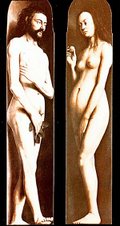
Fave Painting: The Three Ages of Man and Death

by Albrecht Dürer
From the First Chapter
The Secret of Hurricanes : That article in the Waterville Scout said it was Shake- spearean, all that fatalism that guides the Kennedys' lives. The likelihood of untimely death. Recently, another one died in his prime, John-John in an airplane. Not long before that, Bobby's boy. While playing football at high speeds on snow skis. Those Kennedys take some crazy chances. I prefer my own easy ways. Which isn't to say my life hasn't been Shake-spearean. By the time I was sixteen, my life was like the darkened stage at the end of Hamlet or Macbeth. All littered with corpses and treachery.
My Original Artwork: Triptych
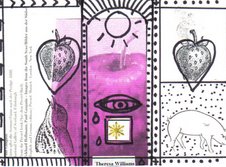
Wishing
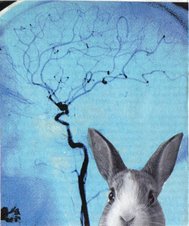
Little Deer
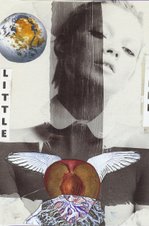
Transformation
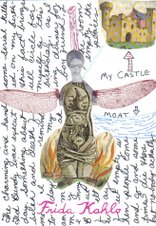
Looking Forward, Looking Back
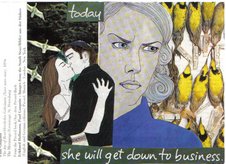
CURRENT MOON
Labels
- adolescence (1)
- Airstream (7)
- Alain de Botton (1)
- all nighters (2)
- Allen (1)
- altars (1)
- Angelus Silesius (2)
- animals (1)
- Annie Dillard (1)
- Antonio Machado (2)
- AOL Redux (1)
- April Fool (1)
- Archibald MacLeish (1)
- arts and crafts (55)
- Auden (1)
- awards (2)
- AWP (2)
- Bach (1)
- Basho (5)
- Beauty and the Beast (1)
- birthdays (1)
- blogs (5)
- boats (2)
- body (2)
- books (7)
- bookstores (1)
- Buddha (1)
- Buddha's Little Instruction Book (2)
- butterfly (4)
- buzzard (2)
- Capote (4)
- Carmel (1)
- Carson McCullers (1)
- cats (15)
- Charles Bukowski (1)
- Charles Simic (2)
- Christina Georgina Rossetti (1)
- church (2)
- confession (1)
- Conrad Aiken (1)
- cooking (5)
- crows (1)
- current events (2)
- D. H. Lawrence (3)
- death (6)
- Delmore Schwartz (4)
- detachment (1)
- dogs (7)
- domestic (3)
- dreams (21)
- Edward Munch (4)
- Edward Thomas (1)
- Eliot (3)
- Eliot's Waste Land (2)
- Emerson (2)
- Emily Dickinson (10)
- ephemera (1)
- Esalen (6)
- essay (3)
- Eugene O'Neill (3)
- Ezra Pound (1)
- F. Scott Fitzgerald (1)
- fairy tales (7)
- Fall (16)
- Famous Quotes (16)
- festivals (2)
- fire (5)
- Floreta (1)
- food (1)
- found notes etc. (1)
- found poem (2)
- fragments (86)
- Frida Kahlo (1)
- frogs-toads (4)
- Georg Trakl (1)
- gifts (1)
- Global Warming (1)
- Gluck (1)
- goats (1)
- Goodwill (1)
- Great lines of poetry (2)
- Haibun (15)
- haibun moleskine journal 2010 (2)
- Haiku (390)
- Hamlet (1)
- Hart Crane (4)
- Hayden Carruth (1)
- Henry Miller (1)
- holiday (12)
- Hyman Sobiloff (1)
- Icarus (1)
- ikkyu (5)
- Imagination (7)
- Ingmar Bergman (1)
- insect (2)
- inspiration (1)
- Issa (5)
- iTunes (1)
- Jack Kerouac (1)
- James Agee (2)
- James Dickey (5)
- James Wright (6)
- John Berryman (3)
- Joseph Campbell Meditation (2)
- journaling (1)
- Jung (1)
- Juniper Tree (1)
- Kafka (1)
- Lao Tzu (1)
- letters (1)
- light (1)
- Lorca (1)
- Lorine Niedecker (2)
- love (3)
- Lucille Clifton (1)
- Marco Polo Quarterly (1)
- Marianne Moore (1)
- Modern Poetry (14)
- moon (6)
- movies (20)
- Muriel Stuart (1)
- muse (3)
- music (8)
- Mystic (1)
- mythology (6)
- nature (3)
- New Yorker (2)
- Nietzsche (1)
- Northfork (2)
- November 12 (1)
- October (6)
- original artwork (21)
- original poem (53)
- Our Dog Buddha (6)
- Our Dog Sweet Pea (7)
- Our Yard (6)
- PAD 2009 (29)
- pad 2010 (30)
- Persephone (1)
- personal story (1)
- philosophy (1)
- Phoku (2)
- photographs (15)
- Picasso (2)
- Pilgrim at Tinker Creek (1)
- Pillow Book (5)
- Pinsky (2)
- plays (1)
- poem (11)
- poet-seeker (9)
- poet-seer (6)
- poetry (55)
- politics (1)
- poppies (2)
- presentations (1)
- Provincetown (51)
- Publications (new and forthcoming) (13)
- rain (4)
- Randall Jarrell (1)
- reading (6)
- recipes (1)
- Reciprocity (1)
- Richard Brautigan (3)
- Richard Wilbur (2)
- Rilke (5)
- river (5)
- river novel (1)
- rivers (12)
- Robert Frost (2)
- Robert Rauschenberg (1)
- Robert Sean Leonard (1)
- Robinson Jeffers (1)
- Rollo May (2)
- Rumi (1)
- Ryokan (1)
- Sexton (1)
- short stories (13)
- skeletons (2)
- sleet (1)
- snake (1)
- Snow (24)
- solitude (1)
- spider (2)
- spring (1)
- Stanley Kunitz (1)
- students (2)
- suffering (4)
- suicide (2)
- summer (20)
- Sylvia Plath (2)
- Talking Writing (1)
- Tao (3)
- teaching (32)
- television (4)
- the artist (2)
- The Bridge (3)
- The Letter Project (4)
- The Shining (1)
- Thelma and Louise (1)
- Theodore Roethke (16)
- Thomas Gospel (1)
- Thomas Hardy (1)
- toys (3)
- Transcendentalism (1)
- Trickster (2)
- Trudell (1)
- Ursula LeGuin (1)
- vacation (10)
- Vermont (6)
- Virginia Woolf (1)
- Vonnegut (2)
- Wallace Stevens (1)
- Walt Whitman (8)
- weather (7)
- website (3)
- what I'm reading (2)
- William Blake (2)
- William Butler Yeats (5)
- wind (3)
- wine (2)
- winter (24)
- wood (3)
- Writing (111)
- Zen (1)



